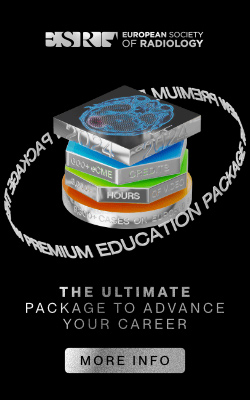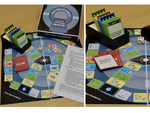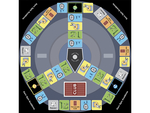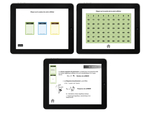Learning objectives
In the context of education for the technologists, including serious board games to the learning cycle of magnetic resonance imaging (MRI) seems interesting, although never done to our knowledge.
We used to develop several board games for both initial and continuing education, aiming at consolidating MRI learning.
Background
Nowadays, numerous pedagogical means and strategies were proposed, allowing the teacher (or the pedagogical team of a training course) to choose among all of them the most adapted pedagogical practices for his (their) goals.
In particular, MRI is a complex technique, notably difficult to understand, with a high risk of students dropout, especially during continuing education courses. In this context, varying teaching sequences is essential. Learning through playing matches this requirement. Currently, serious games are largely computing based, through dedicated softwares or web pages. However,...
Findings and procedure details
To date, 2 games have been finalized:
1. Kern Spin Academy: board game inspired by the well-known "Trivial Pursuit" (Hasbro, Pawtucket, USA).
Alternating questions and answers, it is composed of a game board, 189 cards, each with a question and an answer, divided into 3 categories (physical bases, sequences/image quality, miscellaneous), magnets, chips, a die, the rule and a box.Each category is associated with a color which is also that of the cards and of the spaces on the game board (Fig. 1).
Board was...
Conclusion
Serious games, in classic forms (board or card games), represent a useful and effective pedagogical complement to consolidate MRI learning, a technique that requires significantly more knowledge acquisition than any other medical imaging modality. Of course, using these games is not limited to technologists, but could be adapted to the specific public of any MRI course.
Personal information and conflict of interest
D. Vetter; Haguenau/FR - nothing to disclose P. Choquet; Strasbourg/FR - nothing to disclose J.-P. Dillenseger; Strasbourg/FR - nothing to disclose P.-E. Zorn; Strasbourg/FR - nothing to disclose
References
[1]Remblay-Wragg E, Raby C, Ménard L. En quoi la diversité des stratégies pédagogiques participe-t-elle à la motivation à apprendre des étudiants ? Etude d’un cas particulier.Revue internationale de pédagogie de l’enseignement supérieur, 2018, vol. 34, n° 34-1.
[2]Crespo M, Houle R..La persévérance aux études dans les programmes de premier cycle à l’Université de Montréal. Montréal, Université de Montréal, Vice-décanat aux études supérieures et à la recherche, Publication Faculté des sciences de l’éducation, 1995.
[3]Shiner R. Is there a role for simulation based education within conventional...





